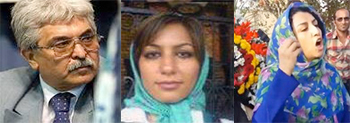 Paris-Geneva, January 21, 2015 – The Observatory for the Protection of Human Rights Defenders, a joint programme of the International Federation for Human Rights (FIDH) and the World Organisation Against Torture (OMCT), deplores the continuing harassment against prominent human rights defenders Nargess Mohammadi, Mahdieh Golrou and Mohammad Seifzadeh in Iran.
Paris-Geneva, January 21, 2015 – The Observatory for the Protection of Human Rights Defenders, a joint programme of the International Federation for Human Rights (FIDH) and the World Organisation Against Torture (OMCT), deplores the continuing harassment against prominent human rights defenders Nargess Mohammadi, Mahdieh Golrou and Mohammad Seifzadeh in Iran.
Last week, Ms. Nargess Mohammadi, Spokesperson and Vice-President of the Defenders of Human Rights Centre (DHRC), was summoned to the Islamic Revolution Prosecutor’s Office based in Evin prison, where she was requested to submit her final statement against the criminal charges she is facing, which include “propaganda against the Islamic Republic,” “assembly and collusion against the national security” and “opposition to the death penalty and membership of the LEGAM group.” (1) Subsequently, the Prosecutor’s Office referred Ms. Mohammadi’s case to the Islamic Revolution Court for trial, commenting in its report that Ms. Mohammadi’s “opposition to death penalty means that she is opposed to qesas , established by a Sharia decree, and that she must therefore account for this.” Whereas the Iranian authorities consider qesas (2) as part of the ‘divine laws’, the Prosecutor’s Office seems intent on exposing her to further judicial harassment in an attempt to sanction her human rights activities.
Ms. Mohammadi had also been detained and harshly interrogated for a few hours by the Ministry of Intelligence officials on December 26, 2014, while on her way to take part in an event commemorating the anniversary of the killing of an individual during protests in 2009. (3)
The Observatory is also concerned about the refusal of judicial officials to allow DHRC founding member Mr. Mohammad Seifzadeh, currently in arbitrary detention, to seek medical care for his kidneys, even though prison doctors have confirmed that he needs to be treated outside of prison. It is also worth noting that although Mr. Seifzadeh had an appointment with a dentist on January 7, 2015, prison officials failed to send him to the dentist’s office. In late September 2013, Branch 54 of the Appeals Court upheld a sentence of six years’ imprisonment earlier imposed on Mr. Mohammad Seifzadeh on February 20, 2013.” (4)
Finally, the Observatory is also concerned about the condition of Ms. Mahdieh Golrou (also spelled Golru or Golroo), women’s rights activist who was arrested on October 26, 2014, at her home in Tehran after she took part in a peaceful protest outside of the Iranian Parliament on October 22, 2014, to denounce a series of recent acid attacks against women in Esfahan, in central Iran. Ms. Golrou spent two months in solitary confinement in Section 2A of Evin prison, which is controlled by the Islamic Revolution Guards Corps, before being moved to a shared cell in the same section of the prison. On January 12, 2015, Ms. Golrou’s case was referred to Branch 15 of the Revolutionary Court of Tehran. However, she has not yet been allowed to meet with the lawyer hired by her family to represent her.
The Observatory calls upon the Iranian authorities to release Mr. Seifzadeh and Ms. Golrou immediately and unconditionally, as their detention is arbitrary since it appears only aimed at sanctioning their human rights activities. The Observatory also calls on the Iranian authorities to put an end to any kind of harassment – including at the judicial level – against Mr. Seifzadeh, Ms. Nargess Mohammadi, Ms. Mahdieh Golrou and all human rights defenders in Iran.
